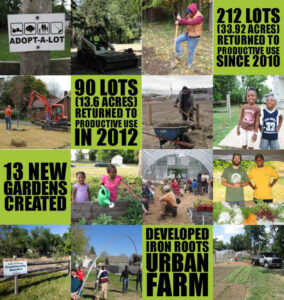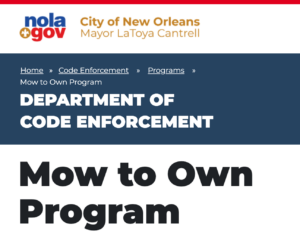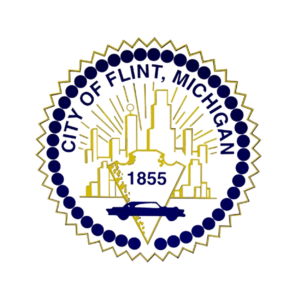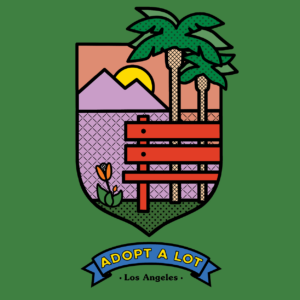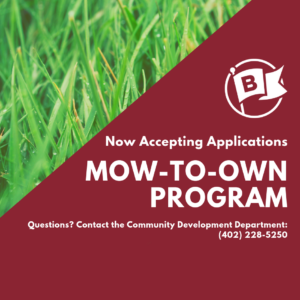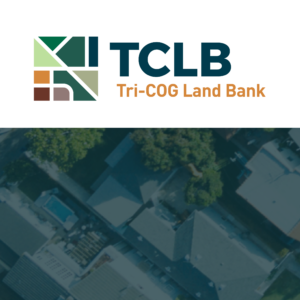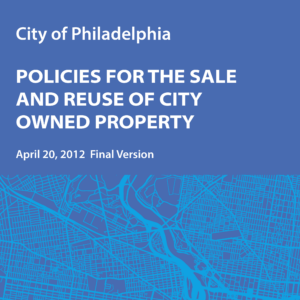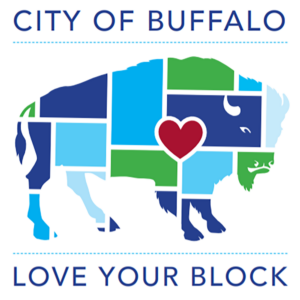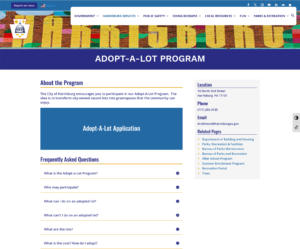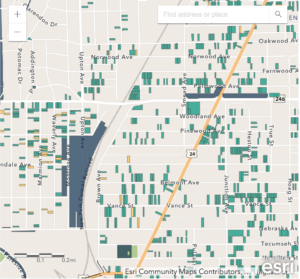Vacant Land Elements Examples
Vacant land stewardship requires four fundamental elements: knowing your community’s context, having clear goals and plans, committing to collaboration, and enacting facilitative policies. These four elements will look different in every community, but they are all critical components of implementing successful vacant land stewardship. To learn more about these elements and discover some next steps for your community's learning journey, explore the element examples below.
Element Type
Organization
Youngstown Neighborhood Development Corporation
Lots of Green was the Youngstown Neighborhood Development Corporation (YNDC)’s vacant land reuse program, which operated cleanups and volunteer workdays in strategic neighborhoods, as well as vacant land reuse classes, microgrant programs, and competitions that catalyzed new projects around the city.
Read More »City of New Orleans
New Orleans’ ‘Mow-to-Own’ Program invites homeowners adjacent to blighted lots to apply to take care of the empty spaces with the goal of purchasing them down the line.
Read More »City of Flint
In 2017, the City of Flint amended its zoning ordinance to create new designations, including a designation that recognizes green reuse as the dominant land use strategy in certain areas of the city.
Read More »Free Lots Angeles collective
Adopt-A-Lot is a pilot program that enables community groups in park-poor Los Angeles neighborhoods to adopt city-owned vacant lots and transform them into community-serving public spaces.
Read More »City of Beatrice
The City of Beatrice, Nebraska runs a Mow-to-Own Program that allows adjacent homeowners, individuals, and developers to acquire city-owned vacant lots after proving they are capable, willing, and consistent with maintaining it.
Read More »Tri-COG Land Bank
The Tri-COG Land Bank offers adjacent homeowners the opportunity to expand their yard through their Side Lot Development Program.
Read More »City of Philadelphia
The City of Philadelphia provides a path to license, lease, and purchase land from the Philadelphia Redevelopment Authority (PRA), the Department of Public Property, and the Philadelphia Housing Development Corporation (PHDC) and supports the use of vacant land for urban agriculture that improves the quality of life in the City.
Read More »City of Buffalo
The Love Your Block Mini-Grant Program offers small grants to neighborhood-based organizations in our target areas for volunteer projects that address vacant, abandoned, and deteriorated properties.
Read More »City of Harrisburg
The City of Harrisburg’s Adopt-A-Lot program allows people to “adopt” city-owned vacant lots for the purpose of maintaining and beautifying them.
Read More »City of Toledo, Ohio
With the help of 52 community mowing partners, the City of Toledo, Ohio’s grass mowing program works each summer to keep parks, neighborhoods, and boulevards neat and tidy.
Read More »- « Previous
- 1
- 2
- 3
- Next »
Grow Pittsburgh
Liability insurance is often required to access land — such as the vacant lots owned by the City of Pittsburgh — or to participate in certain programming A Commercial General Liability (CGL) insurance policy is the first line of defense against many common claims (such as bodily injury or property damage) that could occur in a community garden or on other sites included in the policy.
Read More »City of Camden
The City of Camden zoning ordinance has many goals that align with vacant land reuse and revitalization, including “to conserve a corridor of natural open space (greenways) primarily along waterways within the City” and “to emphasize the need for a wide variety of open space and demonstrate its value as an essential community asset.
Read More »City of Danville
The City of Danville zoning ordinance provides a number of useful tools for vacant lot development, including allowing urban gardening in most districts with a special permit, and creating a designation for districts where new development will infill parcels with vegetation and landscaping.
Read More »City of Baltimore
Open Baltimore is an online data portal that provides the public with access to hundreds of datasets and interactive dashboards, including a Vacant Building Dashboard. The Vacant Building Dashboard shares data on the number of vacant building notices, building rehabs, and demolitions. The data can be sorted and filtered by geographic bounds, time increments, and even “housing market typology.”
Read More »City of Buffalo - Office of Strategic Planning
Buffalo’s Urban Homesteading Program enables eligible residents to purchase publicly owned land at a below market rate. Properties that are within designated Urban Renewal Areas are eligible for inclusion in the Urban Homestead Program at the sole discretion of the Office of Strategic Planning, provided that the property is not needed for public purposes and no qualified buyer is attempting to purchase the property.
Read More »Grounded in Philly
The Vacant Land 215 Toolkit is a guide for both new and current gardeners in Philadelphia looking to use land productively, understand how to gain legal access to City-owned vacant spaces for community food production or open space, or understand what legal protections are available for existing community gardens.
Read More »Urban Redevelopment Authority of Pittsburgh
The Pittsburgh Land Recycling Handbook includes an analysis of distressed land in Pittsburgh, its impact, and the processes for managing it, as well as an operational plan to create a more coordinated and effective land recycling system.
Read More »City of Rochester Division of Real Estate
This website assists residents in accessing or purchasing one of the 3,400 City-owned vacant lots in Rochester for temporary or permanent projects. Some lots are sold for large development projects, many are used as community gardens, and many more are…
Read More »City of Milwaukee Department of City Development
With the help of many dedicated citizens and professionals, the Department of City Development in Milwaukee has put together a handbook of creative reuse strategies for city-owned vacant land.
Read More »Cuyahoga Land Bank
The Cuyahoga Land Bank (CLB) developed their Side Yard Program for eligible applicants to purchase vacant lots to expand their yards or businesses. This is one of their most successful and popular programs that has helped hundreds of Cuyahoga County residents utilize vacant land in resourceful and imaginative ways.
Read More »
